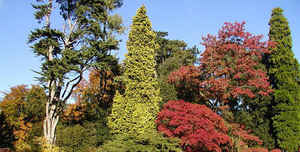
North Carolina Symbols
North Carolina State Tree
Longleaf Pine

(Pinus L. - pine)
Adopted on March 12, 1963.
The pine, (Pinus L. - pine,) was officially designated as North Carolina State Tree by the General Assembly of 1963. (Session Laws, 1963, c. 41).
Contrary to popular belief, no specific type of pine tree was specified in the Session Law. Eight types are considered indigenous to the state, including the eastern white, loblolly, longleaf, pitch, pond, shortleaf, table mountain, and virginia. The pine is the most common of the trees found in North Carolina, as well as the most important one in the history of our State. During the Colonial and early Statehood periods, the pine was a vital part of the economy of North Carolina. From it came many of the "naval stores" - resin, turpentine, and timber - needed by merchants and the navy for their ships. The pine has continued to supply North Carolina with many important wood products, particularly in the building industry.
North Carolina State Tree: Longleaf Pine

The pine is the most common of the trees found in North Carolina, as well as the most important one in the history of our State. During the Colonial and early Statehood periods, the pine was a vital part of the economy of North Carolina. From it came many of the "naval stores" - resin, turpentine, and timber - needed by merchants and the navy for their ships. The pine has continued to supply North Carolina with many important wood products, particularly in the building industry.
 Longleaf pine (Pinus palustris),
whose species name means "of the marsh," has been locally referred to as longstraw, yellow, southern yellow, swamp, hard or heart, pitch, and Georgia
pine. In presettlement times, this premier timber and naval stores tree grew in extensive pure stands throughout the Atlantic and Gulf Coastal Plains.
At one time the longleaf pine forest may have occupied as much as 24 million ha (60 million acres), although by 1985 less than 1.6 million ha (4 million
acres) remained. Today only scattered patches of the longleaf pine/wiregrass ecosystem occur - mostly in the coastal plains of the Carolinas, Georgia,
Florida, Alabama, Louisiana, and Texas. Less than three million acres remain (over 97% decline) and over 30 plant and animal species associated with
longleaf pine ecosystems are threatened or endangered.
Longleaf pine (Pinus palustris),
whose species name means "of the marsh," has been locally referred to as longstraw, yellow, southern yellow, swamp, hard or heart, pitch, and Georgia
pine. In presettlement times, this premier timber and naval stores tree grew in extensive pure stands throughout the Atlantic and Gulf Coastal Plains.
At one time the longleaf pine forest may have occupied as much as 24 million ha (60 million acres), although by 1985 less than 1.6 million ha (4 million
acres) remained. Today only scattered patches of the longleaf pine/wiregrass ecosystem occur - mostly in the coastal plains of the Carolinas, Georgia,
Florida, Alabama, Louisiana, and Texas. Less than three million acres remain (over 97% decline) and over 30 plant and animal species associated with
longleaf pine ecosystems are threatened or endangered.
Identification of the Longleaf Pine

Pinus palustris, commonly known as the Longleaf Pine, is a pine native to the southeastern United States, found along the coastal plain from eastern Texas to southeast Virginia, extending into northern and central Florida
Longleaf pine is an evergreen conifer that got its common name for having the longest leaves of the eastern pine species. The needlelike leaves, which come in bundles of three, can grow up to 18 inches long! Mature trees stand 80 to 100 feet tall. The single trunk, which is covered in thick, scaly bark, reaches up to 3 feet in diameter. The trees naturally prune their lower branches and grow nearly perfectly straight.
- Leaf: Evergreen, very long and feathery (8 to 18 inches long), with three dark green needles per fascicle.
- Flower: Monoecious; males yellow-red, long, in clusters; females oval, purple.
- Fruit: Very large (largest cone in the Eastern U. S. --6 to 10 inches long), ovoid to conical in shape, sessile. Scales are red-brown in color. The umbo is armed with a curved prickle. Maturing September to October.
- Twig: Very stout, brown, with large obvious, asbestos-white buds.
- Bark: Quite scaly, orange-brown to gray, will eventually develop plates.
- Form: A medium-sized tree with a straight trunk, coarse branches and tufted needles at ends of branches.
North Carolina (Session Laws, 1963, c. 41).
H. B. 10 CHAPTER 41
AN ACT TO ADOPT AN OFFICIAL STATE TREE FOR THE STATE OF NORTH CAROLINA.
WHEREAS, the Pine is prevalent, in one of its eight species, in all parts of this State, and is truly representative of the State's historic dependence
upon and concern for its timber and forest resources; and
WHEREAS, there is great demand from all parts of the State that this Legislature adopt an official State tree; and
WHEREAS, the Garden Clubs of North Carolina have conducted a State-wide survey for preference for a State tree, and the Pine was selected by a decided
majority of the votes; Now, therefore,
The General Assembly of North Carolina do enact:
Section 1. The Pine is hereby adopted as the official State tree of the State of North Carolina.
Sec. 2. All laws and clauses of laws in conflict with this Act are hereby repealed.
Sec. 3. This Act shall be in full force and effect from and after its ratification.
In the General Assembly read three times and ratified, this the 12th day of March, 1963.
Taxonomic Hierarchy: Pine Tree
Kingdom: Plantae - Plants
Subkingdom: Tracheobionta - Vascular plants
Superdivision: Spermatophyta - Seed plants
Division: Coniferophyta - Conifers
Class: Pinopsida
Order: Pinales
Family: Pinaceae - Pine family
Genus: Pinus L. - pine
Species:







